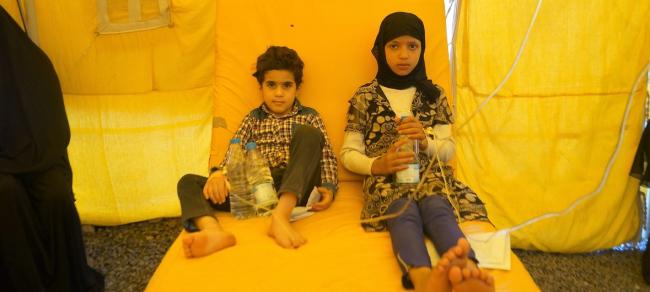
Half the population of Yemen at risk of famine: UN emergency relief chief
New York, Oct 24 (IBNS): Around 14 million people in Yemen, or half the total population of the country, are facing “pre-famine conditions,” said the UN Under-Secretary-General for Humanitarian Affairs, in a briefing to the Security Council on Tuesday.
Mark Lowcock, who is also Emergency Relief Coordinator, said that the UN assessment, which revises September’s estimate of 11 million at risk, is based on recent survey work and analysis, and categorizes “pre-famine conditions,” as meaning those who are entirely reliant on external aid for survival.
Famines, said Lowcock, are a rarity in the modern world, and whilst this is a positive sign of progress, it is also what makes the Yemen situation so shocking.
Although it is difficult to confirm how many are dying from starvation, or starvation-related disease, the relief chief said that health workers are pointing to a rising number of deaths linked to food-related factors, with one aid agency estimating at the end of 2017 that 130 children were dying every day from extreme hunger and disease: nearly 50,000 during the course of a year.
However, many deaths are hidden: “Only half of health facilities are functioning, and many Yemenis are too poor to access the ones that are open. Unable to reach care, people often die at home. Very few families report these deaths; their stories go unrecorded.”
Lowcock said the situation in Yemen is now far more serious than in 2017, when warnings of famine led to a dramatic scaling up of the UN coordinated relief effort, because of the large number of people at risk.
Beyond those at risk of famine, the emergency food assistance on which many millions have been reliant for years is only enough to survive, Lowcock said, adding that their immune systems were literally collapsing, making them – especially children and the elderly – more likely to succumb to malnutrition, cholera and other diseases.
Hudaydah, collapsing economy, exacerbate crisis
The Special Envoy reported little progress on two key issues exacerbating the crisis: fighting around the town of Hudaydah, which is choking aid and commercial operations, and the collapse of the economy.
On the first point, intense fighting, shelling and air strikes have continued to hit Hudaydah in recent days, leading to more than half a million having to leave their homes. Over 5,000 separate violations of international humanitarian law by all parties to the conflict have been recorded since May, including mass civilian casualties.
Humanitarian aid is being severely hampered by delays in issuing visas, restrictions on imports of equipment and cargo and other obstructions, and Lowcock warned that the relief effort will simply be overwhelmed if the fighting does not cease.
The economic situation is dire, with gross domestic product cut by half since 2015, over 600,000 jobs lost, and more than 80 per cent of the population living below the poverty line. Lowcock called for an urgent and substantial injection of foreign exchange, and for payments to pensioners and key public sector workers to resume.
Lowcock called for urgent action in five areas: a cessation of hostilities in and around all the infrastructure and facilities on which the aid operation and commercial importers rely, protection of the supply of food and essential goods across the country, a larger and faster injection of foreign exchange into the economy, increased funding and support for the humanitarian operation, and finally for all belligerents to engage fully with the UN to end the conflict.
OCHA/Ahmed ben Lassoued
Support Our Journalism
We cannot do without you.. your contribution supports unbiased journalism
IBNS is not driven by any ism- not wokeism, not racism, not skewed secularism, not hyper right-wing or left liberal ideals, nor by any hardline religious beliefs or hyper nationalism. We want to serve you good old objective news, as they are. We do not judge or preach. We let people decide for themselves. We only try to present factual and well-sourced news.







